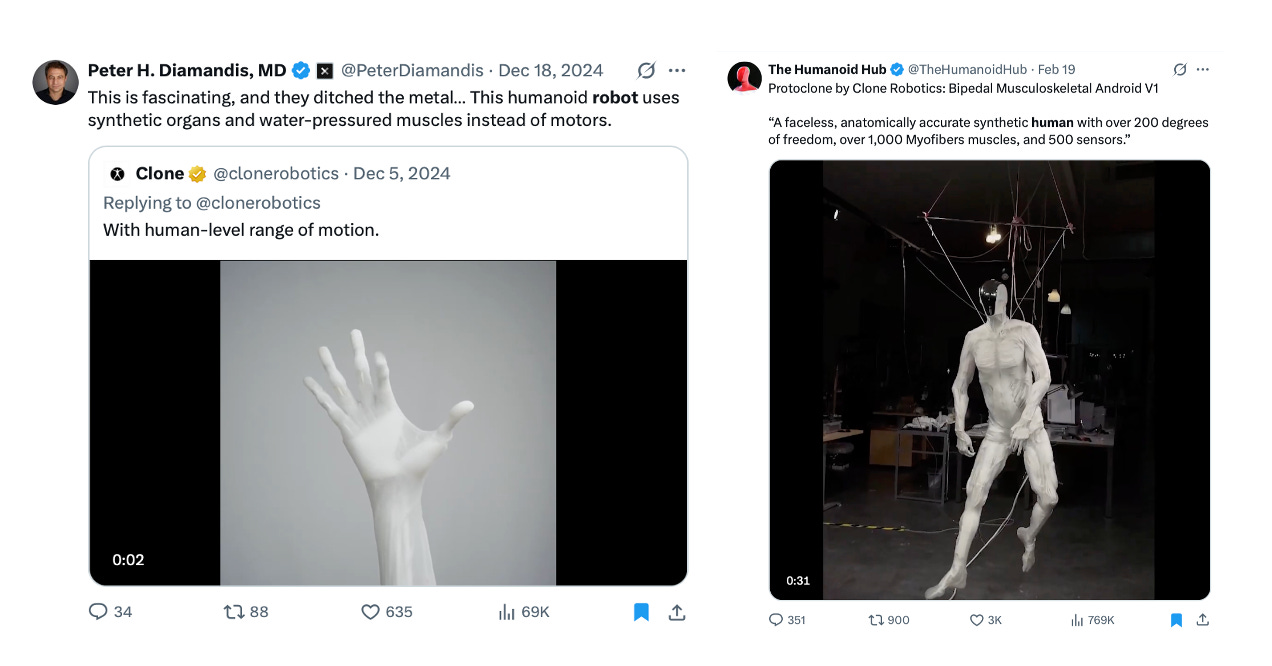This century does not dehumanize us. It disinhabits us.
On one side, humans are redefining their relationship with their own bodies.

From germ theory (1860) to GLP-1 drugs (2023), we have moved from understanding to administration.
The body is no longer a temple; it’s a startup chasing optimization, hacking itself for efficiency.
Meanwhile, Atlas, Figure-01, Clone Alpha, and Protoclone are all androids in pursuit of flesh.
Their synthetic tendons contract like ours, their mimicry verges on illusion. Their proprioceptive sensors—those receptors that grant them spatial awareness—perceive what we are desensitizing ourselves to, absorbed by our screens.
This is not merely a technological breakthrough. It is a metaphysical chiasmus—that rhetorical figure of crossing, where two realities reverse and intertwine.
Francisco Varela, Chilean biologist and philosopher, foresaw it: without a body, there is no true cognition. The machine dreams of flesh, while the human dreams of circuits.
Our trajectory does not trace an evolution, but an evaporation.
Chronology of the Great Chiasmus
Writing: The First Fracture (~3000 BC)
In Phaedrus, Plato denounced the death of living memory, replaced by inert symbols. Orality fades, thought solidifies outside the body. The first Sumerian tablets already mark this initial exile of knowledge beyond ourselves.
The Printing Press: Disembodied Knowledge (15th Century)
The explosion of knowledge accelerates abstraction. Direct experience gives way to text. Gutenberg invented less a technique than a new way of being-in-the-world: we became more learned, yet already more distant.
The Digital Era: Chronos Devoured (20th–21st Century)
Time accelerates. We have archived everything, yet inhabit no memory. We know everything and retain nothing—Chronos devours what he engenders.
The Great Chiasmus: Humanity Evaporates, Machines Embody (21st Century - ?)
Humans abstract themselves from reality, drawn into the mirages of the metaverse. The machine, meanwhile, is learning to walk in our physical world, conquering the space we abandon.
We have ceased to inhabit space.
A world where education prepares us for a future that no longer exists.
Where work produces nomadic bodies, minds evaporated into the cloud.
Where intimacy is within reach, yet out of reach of the soul.
Where politics leaves the agora for the algora, that algorithmic space where the people's voice dissolves into the noise of the screen.
The horizon fades?
Not for everyone.
Robots are learning to walk with their heads held high. They are taught posture, balance, the gaze toward the horizon.
And us? We walk with our heads down, eyes glued to our screens.
We have ceased to inhabit space, to inscribe our gaze into the distance.
Husserl and Merleau-Ponty saw the horizon as the very condition of perception, the line that both delimits and expands our field of experience.
Nietzsche saw in it the fertile tension between man and his becoming, that frontier which recedes as we advance.
Today, it is out of frame, relegated to the background of a two-dimensional existence.
The Project of the Century
This is not an inevitable technological fate. This is not a spontaneous evolution.
It is a project. An industry. A colonization.
Who benefits from humanity’s evaporation?
The GAFAM. The biotechs. The technocrats. The ideologues of performance.
This century does not dehumanize us. It dispossesses us.
And we let it happen.
We have accepted:
That our emotions become emojis.
That our attention is hacked by algorithms.
That our bodies are denied, hacked, overwritten.
That our presence is monetized and exploited.
We have accepted the Great Chiasmus.
But have we already lost everything?
The Boundary Between Human and Machine
Could it be that the true boundary between humans and machines is not consciousness, but presence? That ineffable quality of being there, fully inhabiting the moment, the space, the encounter.
The smombies drifting through our cities, eyes glued to their screens—are they truly more "present" than an Atlas robot that can dance?
And humans, optimized by apps, medications, and digital prosthetics—are they more embodied than an android awkwardly learning to find its footing?
The question is no longer: "Who thinks?"It has become: "Who is present?". Present to oneself. Present to others. Present to the world.
Look. Resist. Reawaken.
And so, we resist. We try to return to the body. Forest bathing, earthing, cold therapy, sensory immersions, inner dance, animal dance... We wrap ourselves in weighted blankets, slip into heavy hoodies. As if adding weight could make up for our absence.
But is being there merely about feeling? Or must we also learn to see?
The final chiasmus will be that of the gaze.
And on that day, the horizon will judge us. But who will meet its gaze?
Not the machine, which sees but does not look.
Not the modern human, who looks but does not see.
And you? Do you still have a gaze to offer? Or have you already dissolved into the interface?
Look.
If you lower your eyes once more, then yes... the horizon is lost.
But if you lift your head, if you truly look... Then perhaps there is still a world left to inhabit.
MD






Thanks so much for these insights! Youve just made my day!!